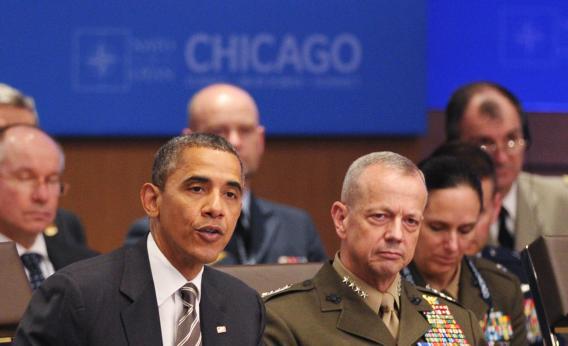The David Petraeus scandal has moved on to General John R. Allen, commander of U.S. and NATO troops in Afghanistan and sender of 20,000 to 30,000 pages of apparently questionable emails to Jill Kelley, the second woman, along with Paula Broadwell, at the center of this crazy story. I am stuck, though, on how this whole investigation got started and how it proceeded. Questions for the FBI:
1) Why did Jill Kelley’s complaint launch an investigation in the first place? She got a half-dozen or so anonymous emails that everyone is calling “harassing.” But from what we know so far, the messages don’t sound alarming or threatening. From a Daily Beast source: “More like, ‘Who do you think you are? … You parade around the base … You need to take it down a notch.’” From the Wall Street Journal: “One asked if Ms. Kelley’s husband was aware of her actions, according to officials. In another, the anonymous writer claimed to have watched Ms. Kelley touching ‘him’ provocatively underneath a table, the officials said.”
That was seriously enough to get the FBI involved? My reporting on cyberbullying tells me that if Kelley had gone to the cops in any decent-sized city, they’d have told her politely not to worry about it. And that’s as it should be: Without anything like an explicit threat—and without any direct reference whatsoever to Petraeus or anyone else in a sensitive position of power—why should law enforcement pry with so little reason to think a crime has been committed? Stalking and harassment are broad charges, sure, and that can cause problems. But those statutes shouldn’t trigger an investigation based on so little evidence. We now know, of course, that the FBI agent Kelley complained to has been accused of sending shirtless photos of himself to her. He’s now himself under investigation. If he got this all rolling to show off to Kelley or to court her, then that is the real scandal. Even if you don’t know much J. Edgar Hoover history, you can see that this is not what the power of the FBI is for. Maybe there is more to justify the FBI’s entry: I’d like to know what persuaded the cybercrimes unit Mr. Shirtless informed to take the next step.
2) Did the government get a warrant to search Paula Broadwell’s email account? Conflicting reports on this one, as Julian Sanchez has noted. The Wall Street Journal says yes but Reuters says no: “The FBI investigation into the emails was fairly straightforward and did not require obtaining court orders to monitor the email accounts of those involved, including the personal email account of Petraeus.” What? Yes, the FBI can read the emails Kelley turned over to them without a warrant. But to go snooping further, shouldn’t investigators have to get one? This is not a legal nicety. Warrants are the basic constitutional check on the power of law enforcement and prosecutors to search and seize.
3) Once the FBI established that neither Broadwell nor Petraeus had committed a crime, why did they tell Director of National Intelligence James Clapper and the White House? This question comes from law professor Orin Kerr at The Volokh Conspiracy. I get that once the FBI found sexually explicit emails between Broadwell and Petraeus (given the potential for blackmailing the head of the CIA), the investigators had to press on. And when Broadwell gave them her computer and they found classified material on it, they had to determine whether it came from Petraeus. But then the Department of Justice reportedly concluded that no crime had been committed. And yet, as Orin writes:
According to the New York Times, at that point the FBI decided to notify the Director of National Intelligence about the investigation. But it’s not entirely clear to me exactly why they did that or who else was notified, or exactly why Petraeus resigned. So the uncertain part of the story isn’t so much the investigation as it is the notification after the investigation had largely (if tentatively) ended. I’d be interested to know who was notified and why; and to the extent we can know, what role those notifications had in Petraeus’s resignation.
Me too. Because once Clapper knew, the White House and the Senate leadership had to know. And at that point, Petraeus was exposed and humiliated. Maybe he resigned on his own, to spare his family, or maybe, as this Washington Post story claims, he did it because Clapper told him to. I don’t feel sorry for Petraeus or Broadwell. But I do have sympathy for their spouses and children, who are being dragged through the worst sort of tabloid mess. And like I said at the outset, I also worry about why the FBI started down this whole road and about high government officials being toppled by private sexual affairs. Maybe Petraeus and Allen deserve to lose their jobs for their idiotic use of email, given how sensitive their positions were/are. But that doesn’t address all the dismaying, unanswered questions about this investigation.
